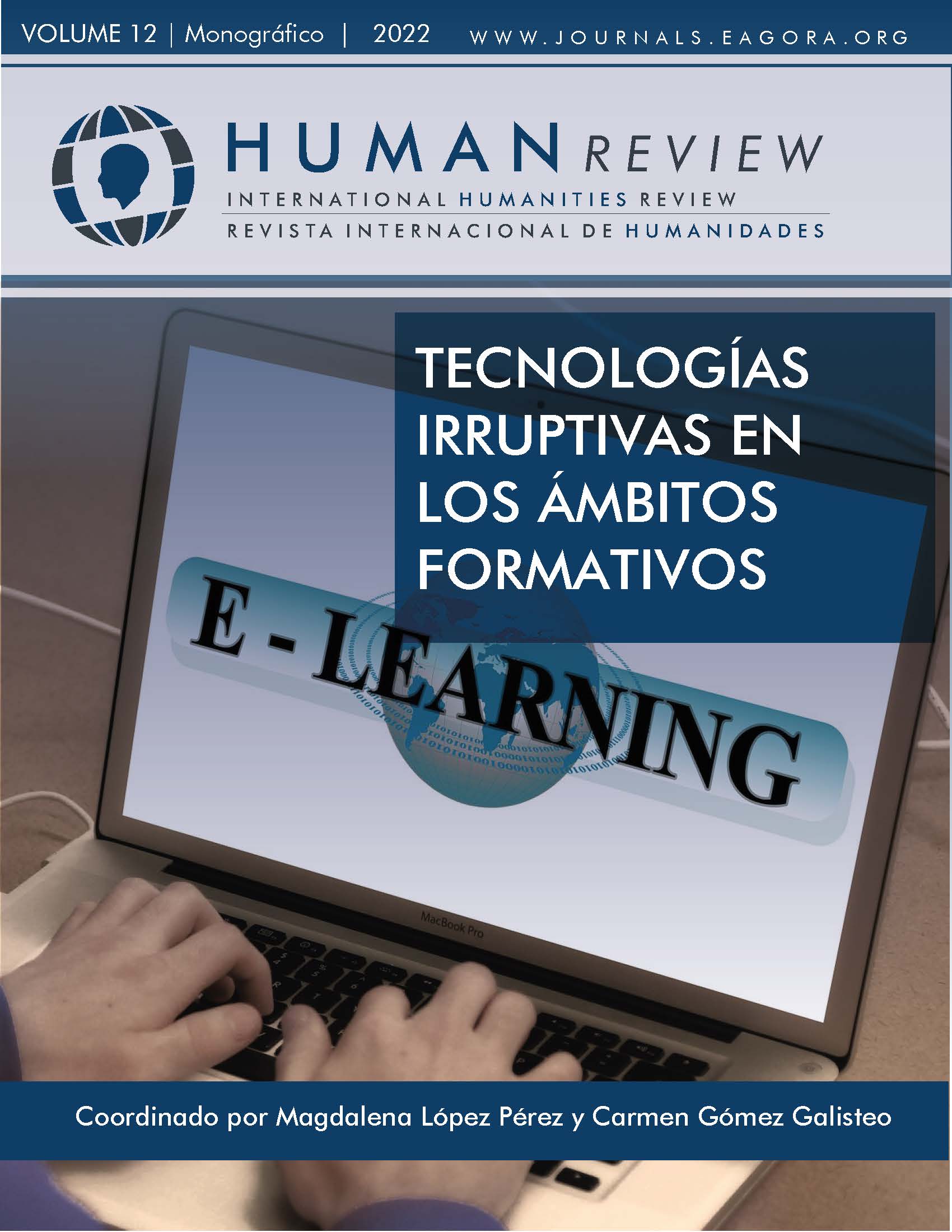Project based learning (PBL) in Secondary classroom
An analysis of its impact and assessment of outcomes from the perspective of Music students
DOI:
https://doi.org/10.37467/revhuman.v11.3966Keywords:
Music teaching and learning, Educational innovation, PBL, ICTs best practice indicators, Self-assessment, Learning process, Self-learning perceptionAbstract
The objective of this study is to analyze the impact of PBL methodology in the subject of music in the Secondary school, as well as to know the students’ perception of their own learning process. A quantitative, exploratory and descriptive design was used in which 21 students and 2 teachers participated. The results indicate that there is a significant improvement in the students’ learning outcomes, although the students’ assessment of the PBL does not fully coincide with these results. This discrepancy will lead to the redesign of the methodology in future interventions.
References
Cahyani, I. (2019). Optimizing Educational Innovation through Problem-based Learning: How Experiential Learning Approach works in Literacy and Language Development. International Journal of Advanced Science and Technology, 28(8), 383-400.
Cain, T. (2005). Lo que aprendí de Alan: Un caso de cambio en la formación inicial del profesorado. Revista Electrónica Complutense de Investigación en Educación Musical, 2, 1.
Carrión, E. (2014). Los medios audiovisuales y las TIC como herramientas para la docencia en Educación Secundaria. Análisis aplicado de una práctica docente. Revista De La Facultad De Educación De Albacete, 29(2), 37-62.
Freinet, C. (2005). Técnicas Freinet de la escuela moderna. Siglo XXI.
Garamendi, B. (2010). Innovación educativa en el área de Música. En A. Giráldez (coord.), P. Alsina, C. De las Cuevas, M.Díaz, S. Flores, M. Á. Galán, B. Garamendi, I. González, A. Murillo, C. L. Nuez, M. Ortega, S. Pedrera.Música. Investigación, innovación y buenas prácticas (pp. 33-48). Graó y Ministerio de Educación.
Larmer, J. y Mergendoller, J.R (2010). The main course, not dessert: How are students reaching 21st century goals with 21st century project based learning? Buck Institute for Education. http://www.bie.org/images/uploads/useful_stuff/Main_Course.pdf
Ley Orgánica 2/2006, de 3 de mayo, de Educación (LOE). Boletín Oficial del Estado, núm. 106, de 4 de mayo de 2006, pp. 17158 a 17207. http://www.boe.es/eli/es/lo/2006/05/03/2/dof/spa/pdf
Ley Orgánica 8/2013, de 9 de diciembre, para la mejora de calidad educativa (LOMCE). Boletín Oficial del Estado, núm. 295, de 10 de diciembre de 2013, pp. 97858 a 97921. http://www.boe.es/boe/dias/2013/12/10/pdfs/BOE-A-2013-12886.pdf
Mergendoller, J. R., Maxwell, N. L., y Bellisimo, Y. (2006). The effectiveness of problem-based instruction: A comparative study of instructional methods and student characteristics. Interdisciplinary journal of problem-based learning, 1(2), 49-69. DOI: https://doi.org/10.7771/1541-5015.1026
Muñoz-Repiso, A. G. V., y Gómez-Pablos, V. B. (2017). Aprendizaje Basado en Proyectos (ABP): evaluación desde la perspectiva de alumnos de Educación Primaria. Revista de investigación educativa, 35(1), 113-131. DOI: https://doi.org/10.6018/rie.35.1.246811
Okoye, K., Nganji, J. T., y Hosseini, S. (2020). Learning analytics for educational innovation: A systematic mapping study of early indicators and success factors. International Journal of Computer Information Systems and Industrial Management Applications, 12, 138-154.
Palacios Núñez, M. L., Toribio López, A., y Deroncele Acosta, A. (2021). Innovación educativa en el desarrollo de aprendizajes relevantes: una revisión sistemática de literatura. Revista Universidad y Sociedad, 13(5), 134-145.
Pedrera, S. (2010). Análisis de algunas problemáticas específicas en la enseñanza y el aprendizaje musical en la educación secundaria obligatoria y el bachillerato. En A. Giráldez (coord.), P. Alsina, C. De las Cuevas, M. Díaz, S. Flores, M. Á. Galán, B. Garamendi, I. González, A. Murillo, C. L. Nuez, M. Ortega, S. Pedrera. Música. Investigación, innovación y buenas prácticas (pp. 11-27). Graó y Ministerio de Educación.
Perrenoud, P. (2007). Aprendre a l‘escola a través dels projectes: per què?, com? Perspectiva escolar, 318, 3-17.
Sanmartí, N. 10 Ideas clave. Evaluar para Aprender. Graó.
Senge, P. (2017, 15 de enero). El profesor del siglo XXI tiene que enseñar lo que no sabe. EL PAÍS. https://elpais.com/economia/2017/01/15/actualidad/1484514194_176496.html.
Serdyukov, P. (2017). Innovation in education: what works, what doesn’t, and what to do about it?. Journal of Research in Innovative Teaching & Learning, 10(1), 4-33. http://doi.org/10.1108/JRIT-10-2016-0007 DOI: https://doi.org/10.1108/JRIT-10-2016-0007
Swanwick, K. (1991). Música, pensamiento y educación. Ministerio de Educación y Ciencia y Morata.
Trujillo, F. (2015). Aprendizaje basado en proyectos. Infantil, Primaria y Secundaria. Ministerio de Educación.
Trujillo, F. (2016). El diseño de proyectos y el currículo. Cuadernos de pedagogía, 472, 66-69.
Valencia, A. J. A., y De Casas Moreno, P. (2019). El uso de las TIC como herramienta de motivación para alumnos de enseñanza secundaria obligatoria. Estudio de caso español. Hamut´ ay,6(3), 37-49. DOI: https://doi.org/10.21503/hamu.v6i3.1845
Vergara Ramírez, J. J. (2015). Aprendo porque quiero. El Aprendizaje Basado en Proyectos (ABP), paso a paso. SM.
Zabala Vidiella, A. (2007). La práctica educativa. Como enseñar. Graó.
Zabala Vidiella, A., Arnau Belmonte, L. (2014). Métodos para la enseñanza de las es. Graó.
Zorrilla-Pacheco, S. C., Flores-Samaniego, Á. H., y Jiménez-Gaona, Y. C. (2022). El Aprendizaje Basado en Proyectos y su aplicación didáctica en la enseñanza de las medidas de localización. Revista Electrónica Calidad en la Educación Superior, 13(1), 226-249. DOI: https://doi.org/10.22458/caes.v13i1.4043
Downloads
Published
How to Cite
Issue
Section
License
Those authors who publish in this journal accept the following terms:
- Authors will keep the moral right of the work and they will transfer the commercial rights.
- After 1 year from publication, the work shall thereafter be open access online on our website, but will retain copyright.
- In the event that the authors wish to assign an Creative Commons (CC) license, they may request it by writing to publishing@eagora.org









